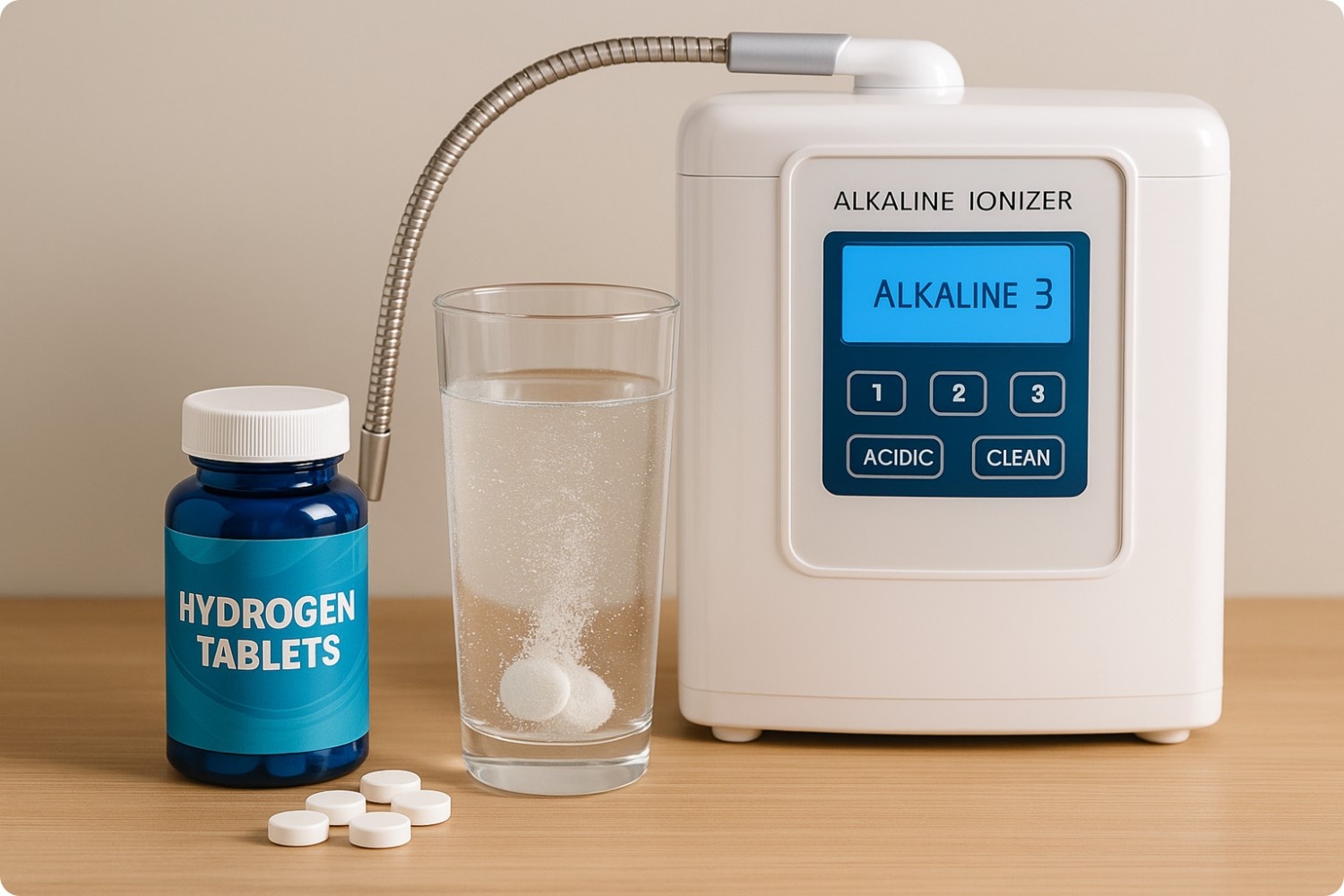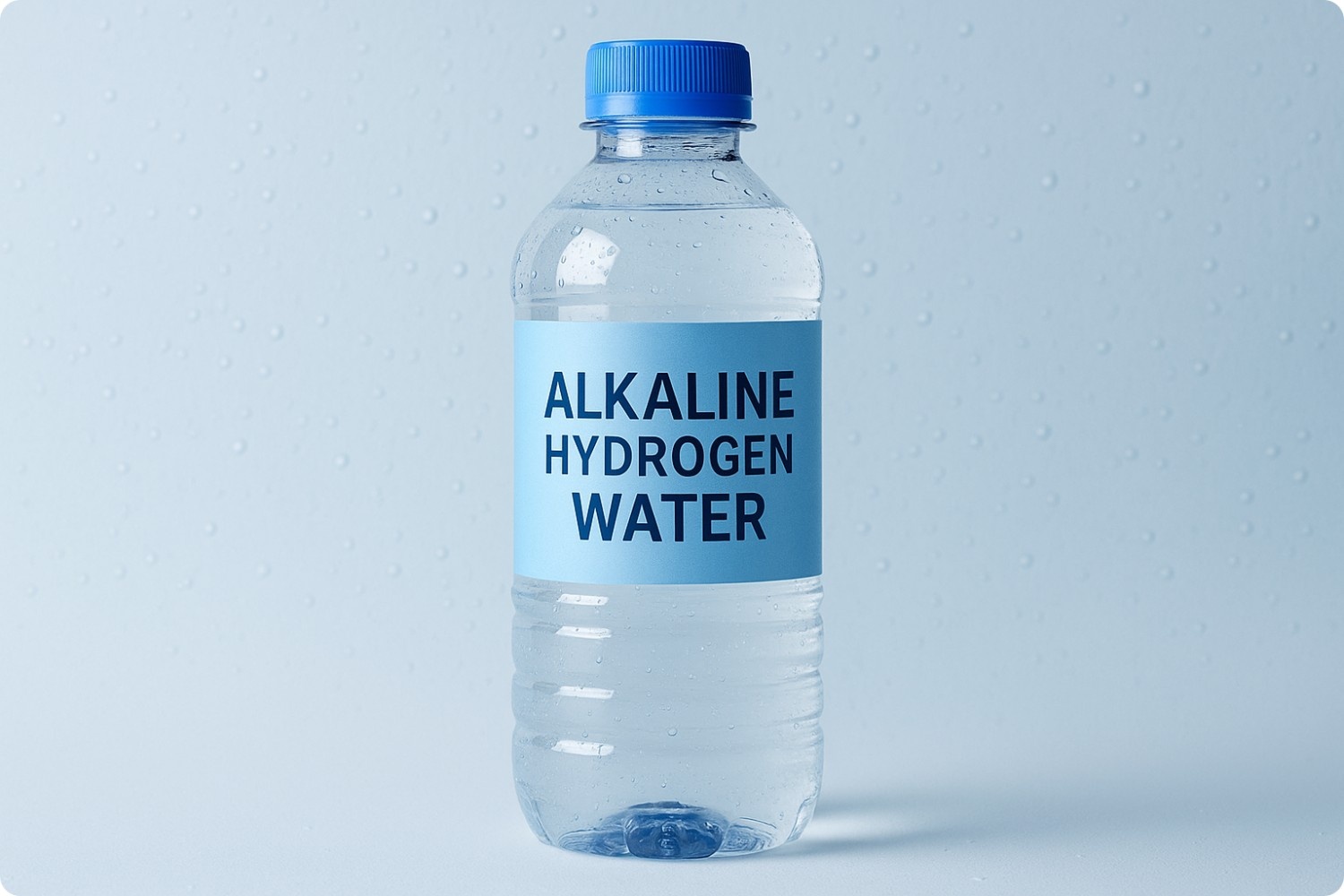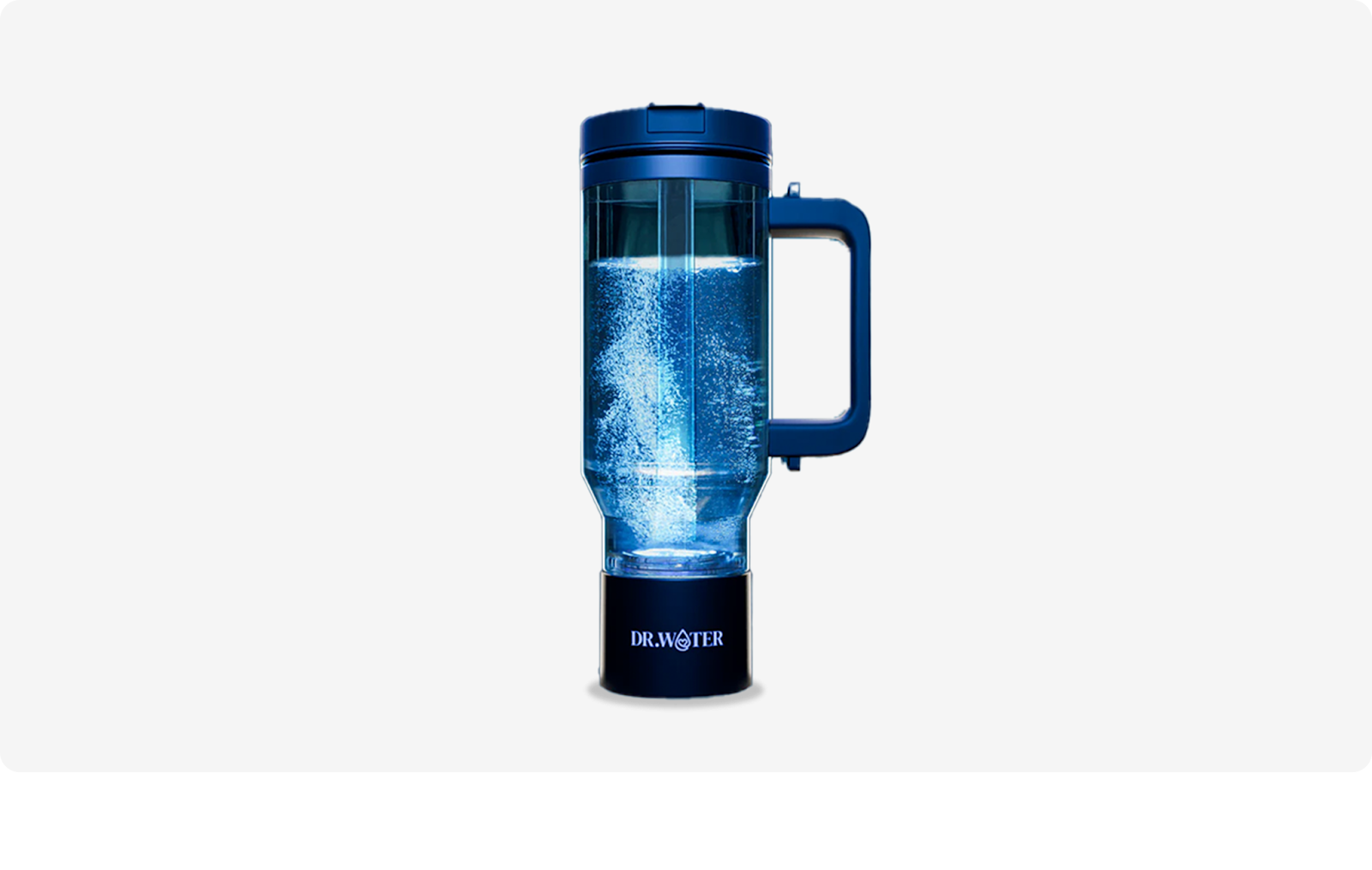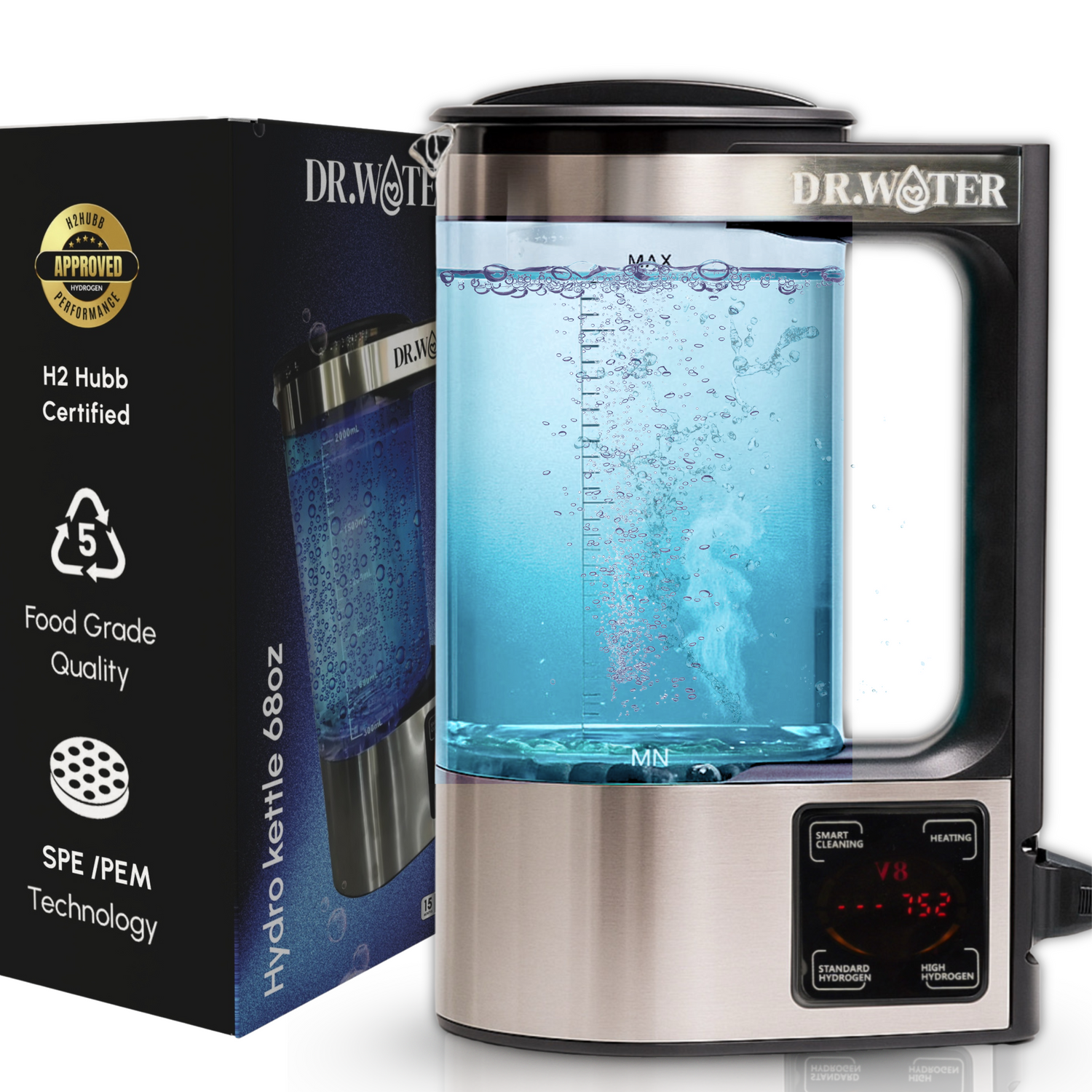
Hydrogen Water and Alkaline Water: Health Benefits and Differences
Share
Summary
|
If you're into wellness trends, chances are you've come across both hydrogen water and alkaline water. They’re everywhere, from your favorite gym's fridge to influencer kitchen counters. But while they might sound similar, they work very differently inside your body.
This guide breaks down the benefits of alkaline hydrogen water, how they’re made, and how to choose what suits your needs the best.
Understanding the Basics
Understanding the differences between hydrogen water, alkaline water, and alkaline hydrogen water can help you make more informed choices about what you drink. Each type offers unique properties, but they’re often confused or used interchangeably. Here’s what each of them does:
-
Hydrogen Water: This is just regular water that’s been infused with molecular hydrogen (H₂). It’s often praised for its potential antioxidant effects and how it may support cellular health.
-
Alkaline Water: Alkaline water has a higher pH, usually around 8 to 9. It’s either mineral-enhanced or processed through ionization to reduce acidity.
- Alkaline Hydrogen Water: It’s water that combines both elevated pH (alkaline) and molecular hydrogen. The idea is to offer the best of both worlds, antioxidant support from hydrogen, and reduced acidity from alkalinity. It’s often promoted as a way to get the benefits of both in one bottle.
Now you know the basics of each type of water, so let’s discuss the benefits of all of them.
Health Benefits Of Hydrogen Water and Alkaline Water
When it comes to functional water, hydrogen and alkaline water are often mentioned in the same breath. Both have carved out space in the wellness world, but they’re not the same thing.
If you’ve ever wondered whether one offers more real health benefits than the other, you're not alone. Let’s break it down with a quick side-by-side comparison to see where the science actually stands.
As you can see, hydrogen water holds up stronger under clinical research, especially when it comes to long-term health markers like oxidative stress, recovery, and metabolic support.
Alkaline water, while still popular, leans more on personal experience than peer-reviewed studies. If you're thinking about upgrading your hydration habits, it’s worth looking at which of these options brings more than just trend value to the table.
How They’re Made and How to Use Them
- Hydrogen Water
Hydrogen water is typically made through electrolysis, where a small charge is passed through the water to release molecular hydrogen (H₂). Another method is dropping hydrogen tablets into water, which dissolve and infuse it with gas. For the best results, drink it fresh; hydrogen escapes quickly, so it’s most effective when consumed right after it's made.
- Alkaline Water
Alkaline water is created by using an ionizer that alters the water’s pH or by adding mineral-rich powders that raise it. It's often used to help offset an acidic diet. Sip throughout the day, ideally between meals, for steady hydration without interfering with digestion.
- Alkaline Hydrogen Water
This combines both methods using dual-function ionizers or bottles that increase both hydrogen concentration and pH. It’s designed to deliver antioxidant support with added alkalinity. Like hydrogen water, it’s best consumed fresh to get the full benefit of dissolved hydrogen.
Each type has its own setup, but the goal is the same. Choosing the right one often comes down to what fits best into your lifestyle and what kind of benefits you're looking for.
What You Should Know About Alkaline Hydrogen Water?
After learning about the individual benefits of hydrogen and alkaline water, it’s no surprise that some products aim to combine the two.
Alkaline hydrogen water brings together the potential antioxidant support of molecular hydrogen with the acid-neutralizing effects of higher pH, all in one bottle. In theory, it sounds like the best of both worlds.
But here’s what to keep in mind:
-
Hydrogen levels can drop quickly: The effectiveness largely depends on how well the product retains dissolved hydrogen. Since hydrogen escapes quickly, the health benefits can drop off fast if the water sits too long.
-
Some products don’t deliver both benefits well: Not every device or bottled option manages to maintain both a high pH and a meaningful hydrogen concentration. Some may emphasize one feature more than the other.
- Not everyone reacts the same way: A higher pH isn’t always a fit for everyone. People with certain digestive sensitivities may find that consistently drinking alkaline water causes mild discomfort, especially when consumed in large amounts.
In short, alkaline hydrogen water can be beneficial but it’s important to know how your body responds and whether the product you're using actually delivers what it promises.
What Should You Keep in Mind Before Choosing One?
Before you invest in a hydrogen or alkaline water setup, here are a few things you should keep in mind while choosing either one of them:
Hydrogen Water
- Device quality really matters: Not all bottles produce the same results. Cheaper ones often don’t hold hydrogen levels for long, so look for products that share actual H₂ concentration numbers.
- The research is still early, but promising: Studies on hydrogen water are growing, but most are small. There’s potential, but it’s good to stay grounded in what’s been proven so far.
- Generally considered safe: Since hydrogen is something your body naturally produces, most people can drink it without worry.
Alkaline Water
- Check where the alkalinity comes from: Some alkaline water is just filtered tap water with added ions, but low in beneficial minerals.
- May affect digestion for some people: If you have gut issues or take certain meds, talk to a doctor first, alkaline water can sometimes disrupt natural stomach acid.
- Evidence is mixed: Some studies suggest benefits, others show little to no change in things like blood pH. Largely, research is lacking when alkaline water is compared to hydrogen water.
Alkaline Hydrogen Water
- Balance is key: Combining both sounds great, but if the pH is too high or the hydrogen isn’t stable, you may not get the full benefit of either.
- Expect higher upkeep and cost: Multi-feature bottles or machines can get expensive, and they often need more frequent cleaning to avoid scale and buildup.
Choosing the right type of water depends on your lifestyle choices but what matters the most is the technology you are using. You won’t get the full benefits it offers if your product isn’t reliable. Now, let’s discuss one such product that delivers on its promise.
Dr. Water’s HydroStanley
If you're curious about hydrogen water but don’t want to deal with complicated machines, the Dr. Water’s HydroStanley is an easy and reliable place to start. It doesn’t alter your water’s pH, just focuses on infusing it with pure molecular hydrogen.
Key features:
- Delivers a full 2.8 mg dose of hydrogen in a single fill
- No filters or cartridges to replace
- Built-in self-cleaning system for low-maintenance use
- Easy one-button operation
- Durable, travel-friendly design with a clean-tasting glass interior
It’s a straightforward way to make hydrogen water part of your daily routine.
Conclusion
Hydrogen water and alkaline water each come with their own set of potential perks, and they aren’t necessarily interchangeable. If you’re looking for something backed by strong antioxidant properties and low-risk, hydrogen water is the better choice. Alkaline hydrogen water is worth considering, too, but only if you’re clear on what your body actually needs.
While alkaline hydrogen water sounds promising, it’s important to know that most of the documented health benefits are linked specifically to molecular hydrogen, not the alkaline pH. That means if you're choosing between the two, the hydrogen content is what really makes the difference. A high-quality hydrogen bottle like Dr. Water’s HydroStanley can help you with that.

